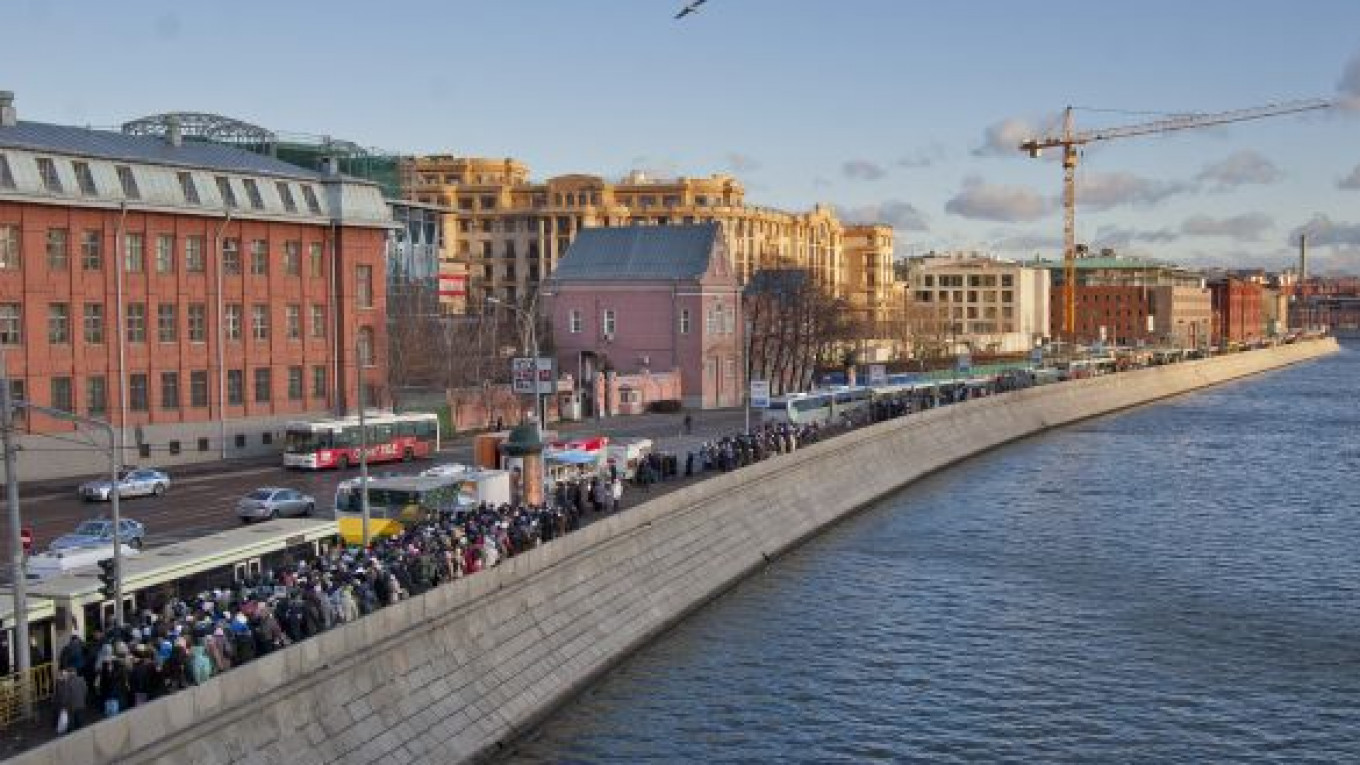Tens of thousands of Russians lined up outside the Christ the Savior Cathedral on Saturday for a chance to kiss a relic of the Virgin Mary brought from a Greek monastery a few weeks before parliamentary elections.
The Cincture of the Virgin Mary, believed by the faithful to be the belt worn by the Madonna, is said to promote fertility and good health and was brought by Greek monks to Russia last month, greeted on arrival by Prime Minister Vladimir Putin.
Putin, whose United Russia party hopes to maintain domination of the State Duma in the elections on Dec. 4, has long courted the Orthodox Church. A former KGB spy, he now portrays himself as a devout Christian.
"We have been married for nine years already, and we very much want to have a child, maybe this belt will help us," 32-year-old Irina Khilchenko said as she stood in near-freezing temperatures in front of her husband, Valery.
The couple, from Bryansk, traveled six hours by bus and had been standing close to the front of the line outside the cathedral for about 13 hours to wait for the relic's arrival.
More than 2 million Russians have seen the relic in the past few weeks in cities including Norilsk, Vladivostok and Yekaterinburg, said the St. Andrew the First-Called Foundation, which arranged the tour.
The foundation, chaired by the head of Russia's state railways and long-time Putin associate Vladimir Yakunin, said the relic's arrival shortly before the parliamentary elections was coincidental.
"It is absolutely not related. We wanted it to come in the summer, but the entire process, the discussions, took a long time," spokesman Alexander Gatilin said.
He said the Cincture, which is usually stored at the Vatopedi Monastery on Mount Athos, had not left Greece for the past 200 years.
The arrival of the belt, with its reputed health benefits, coincides with government efforts to boost Russia's population, which has declined to 142 million since the Soviet Union broke up, threatening a demographic crisis. The Russian Orthodox Church has backed the campaign.
Pilgrims polled in the line outside the cathedral, rebuilt in the 1990s after the Soviet leadership blew it up in 1931, unanimously backed the Orthodox Church's view.
"It is a great sin," 52-year-old Kursk native Valentina Myasnyankina said, as others murmured in agreement.
Most also voiced support for the United Russia party.
"In general I think Orthodox believers will vote for the party that is closest to the Orthodox Church," said Nina Antonova, who arrived Saturday morning from Bryansk. "That party is United Russia."
The 63-year-old grandmother flashed a gold-toothed smile, and shortly thereafter the church bells rang out above the din of weekend city traffic.
A Message from The Moscow Times:
Dear readers,
We are facing unprecedented challenges. Russia's Prosecutor General's Office has designated The Moscow Times as an "undesirable" organization, criminalizing our work and putting our staff at risk of prosecution. This follows our earlier unjust labeling as a "foreign agent."
These actions are direct attempts to silence independent journalism in Russia. The authorities claim our work "discredits the decisions of the Russian leadership." We see things differently: we strive to provide accurate, unbiased reporting on Russia.
We, the journalists of The Moscow Times, refuse to be silenced. But to continue our work, we need your help.
Your support, no matter how small, makes a world of difference. If you can, please support us monthly starting from just $2. It's quick to set up, and every contribution makes a significant impact.
By supporting The Moscow Times, you're defending open, independent journalism in the face of repression. Thank you for standing with us.
Remind me later.






